Assignments – Retract feedback in bulk on the Submissions page | Updated
The Submissions page in the Assignments tool now aligns with Discussions and Quizzes, allowing instructors to retract feedback in bulk. This enhancement improves consistency and eliminates the need to use multiple tools for retraction tasks.
The bulk Retract Feedback option allows instructors to choose how many learners to retract published feedback from.
Selective retraction is also supported. Instructors can select users by checking the box next to their names and then clicking More Actions > Retract Feedback.
The More Actions > Retract All option retracts feedback for all users, regardless of which users are selected.
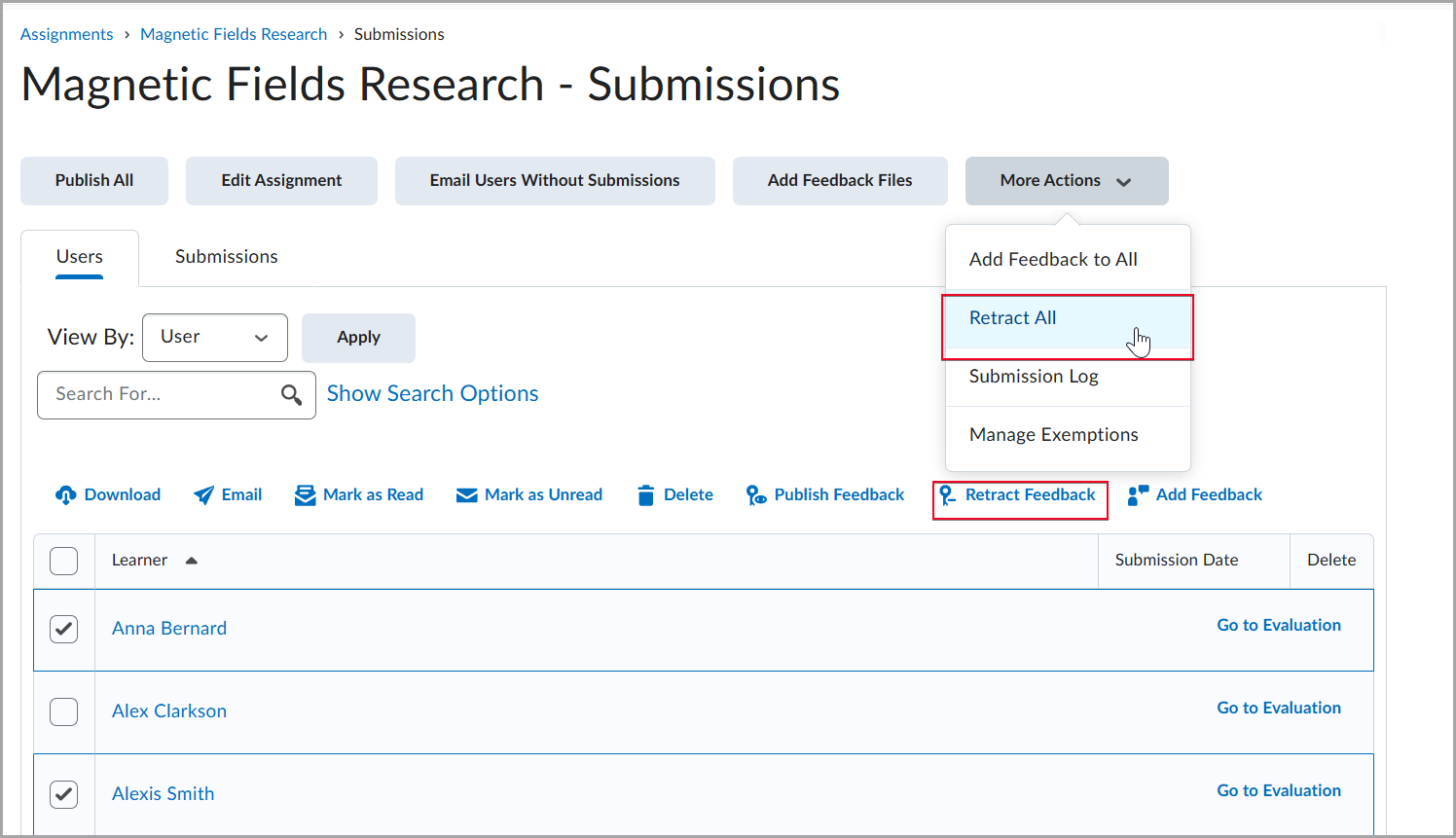
Figure: From the Submissions page, click More Actions and select Retract All to remove published feedback in bulk.
After clicking Retract All, instructors are notified of the number of evaluations to be retracted and must confirm by clicking Retract.
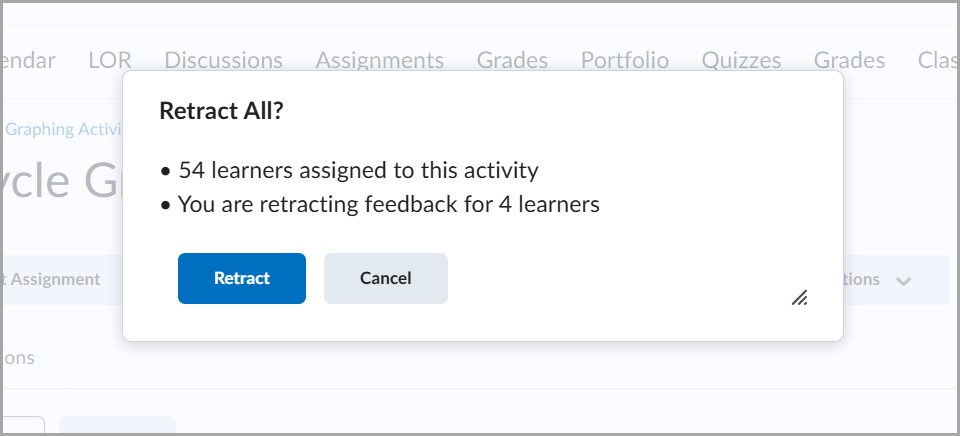
Figure: A confirmation dialog displays the number of learners affected. Click Retract to proceed or Cancel to exit.
Previously, instructors could only retract feedback individually in the Assignments tool.
This feature implements the following PIE items:
- D1361 (Allow method to bulk unpublish dropbox feedback)
- D5593 (Retract Assignment Feedback in Bulk)
Brightspace Course Connector for Microsoft Teams® – Create group-based teams and view recent message activity | New
This feature includes the following new functionality in the Brightspace Course Connector for Microsoft Teams:
- Display message counts for teams
- Create a team for each group in a group category and access the links to teams in the widget
Display message counts for teams
Administrators can now configure the Brightspace Course Connector widget to display the number of new messages posted to each connected Microsoft Teams space. Message counts indicate the number of new messages posted to the team for the configured time span. Administrators can set how far back message counts are retrieved using the Current Team Message Count setting up to 72 hours (the default setting is 24 hours). Once enabled, instructors can view the message count for each team in the widget. They can choose to mute or unmute the message count using the drop-down option to the left of the message count.
 |
Note: To retrieve the message count, the Course Connector must receive permission from teams to count these messages. A consent message appears in the widget once this feature is enabled. |
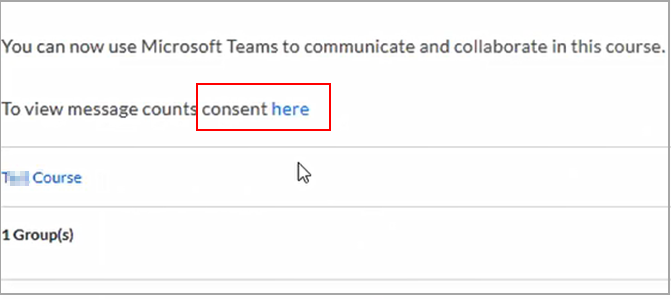
Figure: After the Brightspace Course Connector widget is configured to display message counts, users are prompted to give consent by clicking here in the dialog.
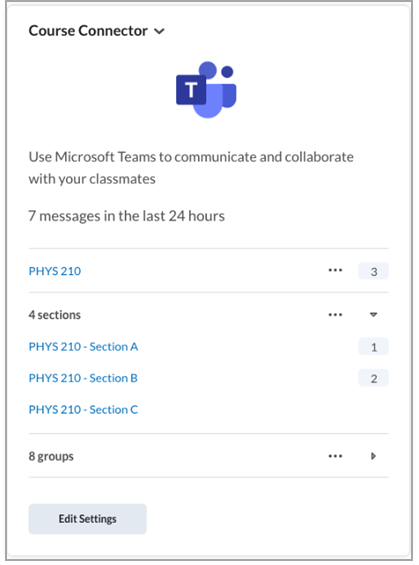
Figure: View the message count for each team in Microsoft Teams from the Course Connector widget.
Create Teams by group category
Instructors can now streamline course organization by using the Create a Team option for groups in a group category option in the Brightspace Course Connector. When enabled, the Course Connector automatically creates a Microsoft Teams space for each group within a selected Brightspace group category. Instructors may select individual categories and Course Connector will create teams for each group within that category.
Instructors are assigned as owners of each team, and learners who belong to multiple Brightspace groups are added to the corresponding teams. Group membership is synchronized periodically.
Once created, the list of linked teams appears in the Course Connector widget. Instructors and learners can select a link to access the corresponding team directly.
Notifications – Unsubscribe from all | New
To improve user experience and reduce unwanted emails, notification emails from Brightspace now include an Unsubscribe link. Selecting the link opens a confirmation screen that allows users to opt out of email notifications, including instant and summary notifications.
 |
Note: The Unsubscribe link does not require the user to enter Brightspace login credentials, which allows users without access to opt out directly. |
Previously, users without login access could not unsubscribe unless they logged in to adjust their notification settings.
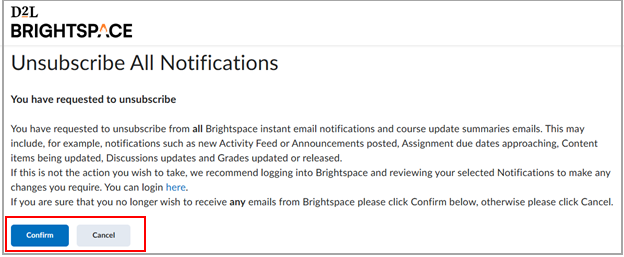
Figure: The Unsubscribe All Notifications confirmation page appears after clicking Unsubscribe in an email.
 |
Note: If a user accidentally unsubscribes, they must log in to Brightspace to resubscribe to Notifications. |
Groups – Export group enrollment data | New
Instructors can now export group enrollment data from the Groups tool to support easier attendance tracking, group-specific class lists, and contact list creation.
A new Export button now appears in the Groups tool for users with the Manage Groups and Categories permission. Instructors can use this button to export group data to a CSV file. The exported content includes:
- Group category details
- Group names
- User enrollment information
- Enrollment dates
You can choose a specific group or all groups within a selected category to include in the export.
 |
Note: User details, such as First Name, Last Name, and Username, only appear if the user’s role has the appropriate User Information Privacy permissions to view user data. |
Previously, there was no built-in method to export group data or user enrollment dates from the Groups tool.
This feature implements the following PIE items:
- D295 (Export Groups: Export Group Enrolments and/or Statistics to a CSV spreadsheet)
- D9175 (Add times and dates of students enrolled in groups created)
This feature partially implements the following PIE items:
- D7413 (Viewing Group Category/Group Enrollments Quickly)
- D345 (Show all Group Categories (or more than one Group Category) on the main Groups page)
- D5236 (Printing Groups)
- D454 (Group Statistics: View the date and time students self-enrolled in a group)
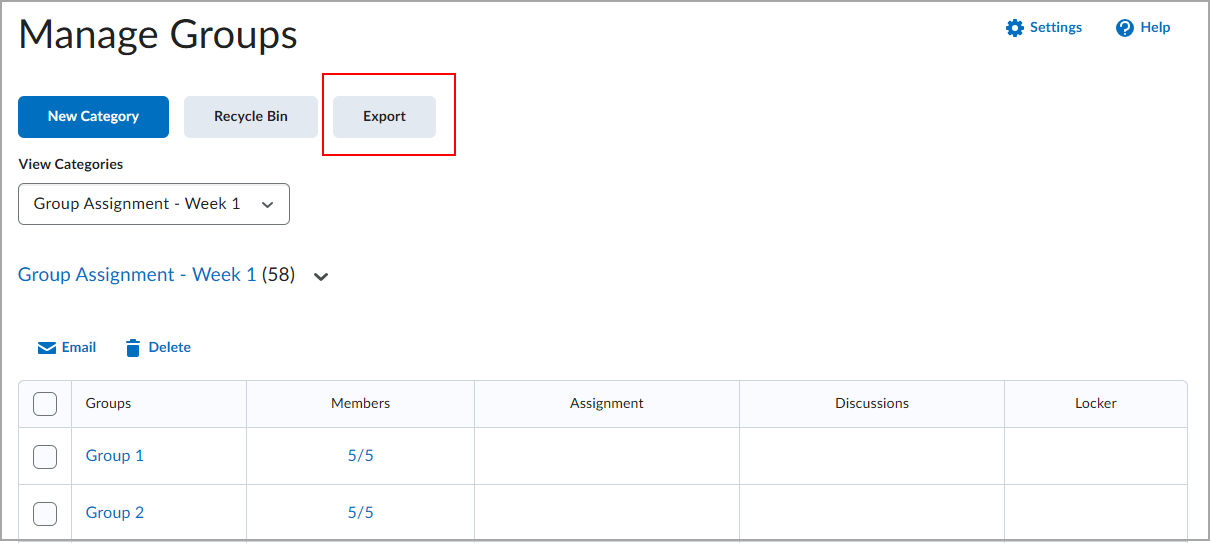
Figure: From the Manage Groups page, click Export to download group data.
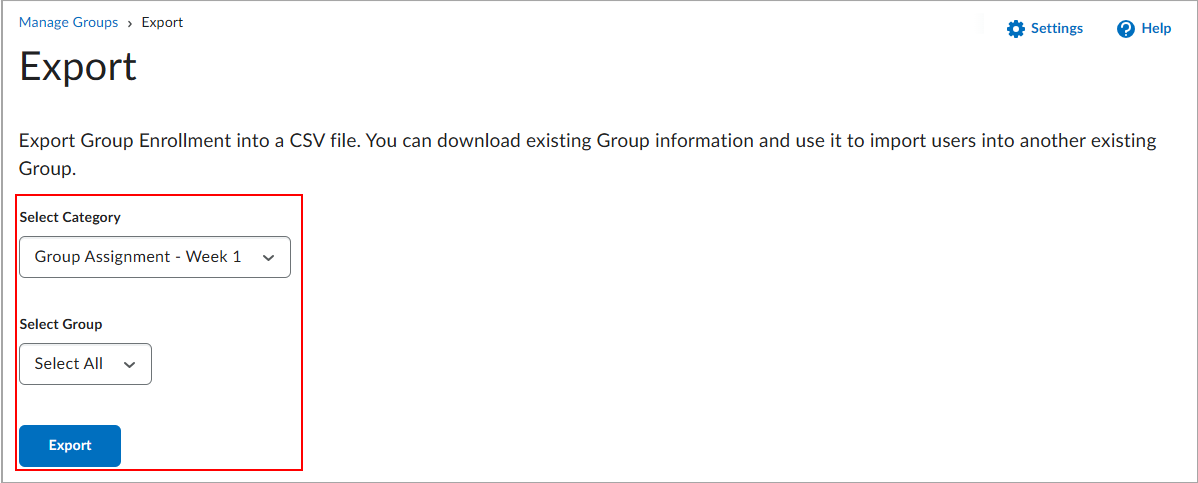
Figure: From the Export page, use the Select Category and Select Group drop-downs to choose the desired group set, then click Export to download group data.
Pulse – View recurring events | New
Pulse now displays recurring events from the Events tab. This ensures that any recurring events that an instructor creates using the Calendar tool properly displays in Pulse. Previously, recurring events did not display in Pulse.
Quizzes – Enhanced Learner Submission View | Updated
The quiz submission page now features a sleeker, modernized layout. The previous banner image has been replaced with a checkmark icon, along with other visual updates.
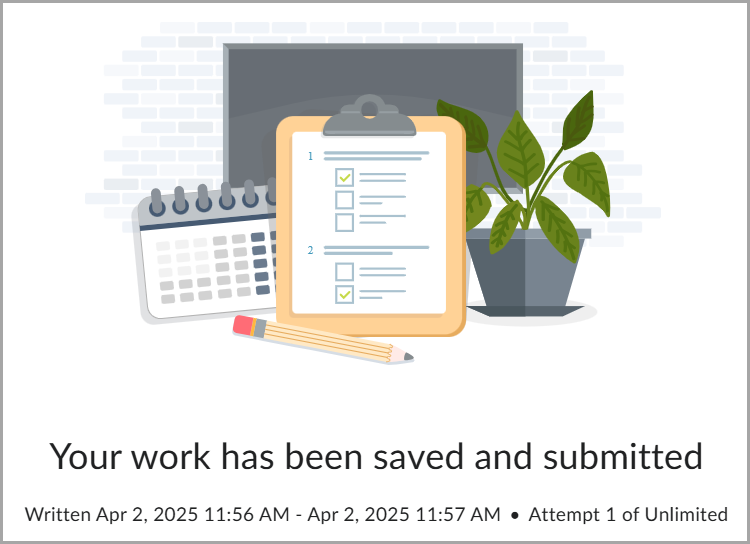
Figure: The quiz submission page before this update.

Figure: The quiz submission page after this update.
Quizzes – Improved quiz monitoring with Session IDs in Attempt Logs | New
This release introduces the new d2l.Tools.Quizzes.ShowSessionId (Org Unit) configuration variable (default: OFF), which allows administrators to control whether instructors can view the Session ID column in quiz attempt logs.
When enabled, instructors can use session IDs to discern when learners have multiple sessions within a quiz attempt, helping detect potential academic dishonesty.
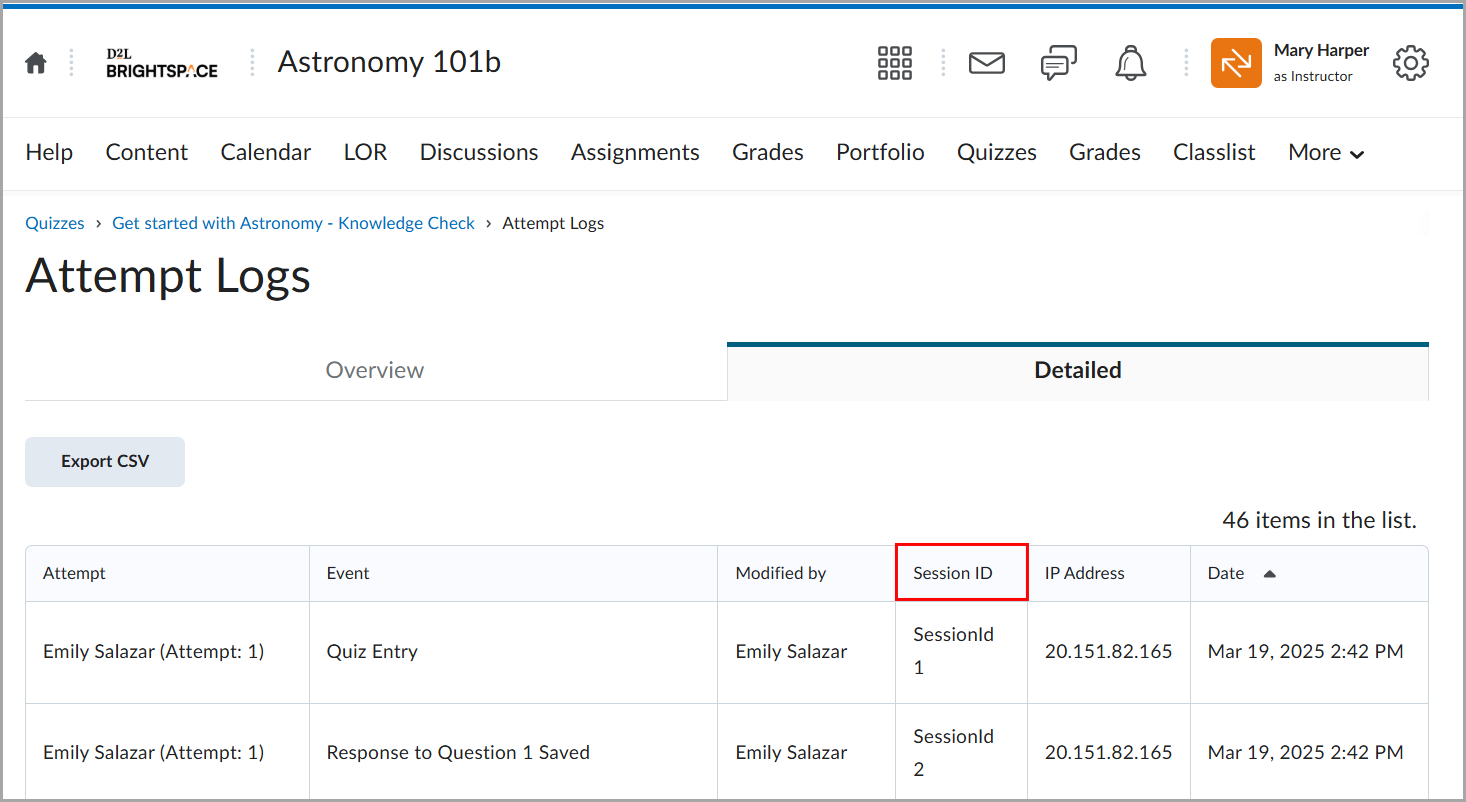
Figure: Check the Session ID column when viewing Attempt Logs > Detailed.
